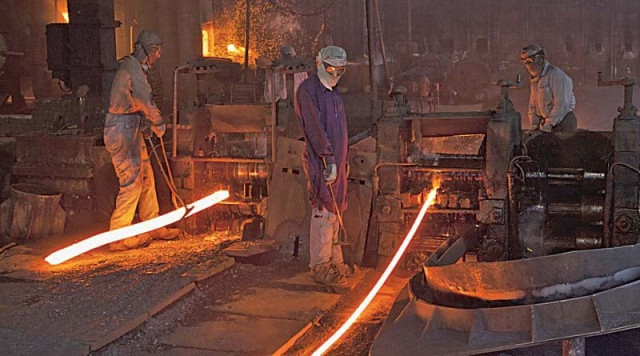Steel sector demands subsidised electricity
Says it will support govt’s low-cost housing scheme, other construction initiatives

Steel manufacturers have urged the government to utilise the surplus electricity generation capacity by offering energy to the sector at subsidised rates to curb the cost of steel bars.
They stressed that a drop in rates of steel would support the government’s low-cost housing scheme as well as other construction initiatives.
“Such a decision will help the government convert the daunting challenge of paying huge sums for surplus capacity to independent power producers (IPPs) into an opportunity for the country,” remarked Pakistan Association of Large Steel Producers (PALSP) Secretary General Syed Wajid Bukhari on Monday.
“Pakistan is paying huge amounts to IPPs in capacity charges, which are now becoming a threat to the country.” Speaking to The Express Tribune, he pointed out that prices of steel rebar had been climbing persistently for the last one year.
READ Steel rebar prices soar again
Citing figures, he said that the price of steel rebar currently stood at Rs175 per kg compared to Rs152 in June 2021, an increase of Rs23. In September 2020, the rebar cost had been around Rs117 per kg.
The cost of electricity made up 15% of the total expenses borne to produce steel, therefore, the sector was highly dependent on energy, he said.
“Cheap electricity is imperative for the survival of steel industry. Energy tariffs in Pakistan are the highest in region and now they are beginning to jeopardise steel production.”
Bukhari noted that the cost of an electricity unit for industrial consumers ranged from 12.28 cents to 16.14 cents per kilowatt-hour while in Vietnam it amounted to 7.3 cents per kilowatt-hour.
According to him, India charged 7.1 cents per kilowatt-hour while 6.1 cents were being charged in Xinjiang, China.
“We believe that the government is making every possible effort to boost the local industry as well as the economy,” he said. “To achieve this, the Economic Coordination Committee (ECC) of the cabinet approved the extension of incremental consumption package, however, no notification has been issued in this regard so far.”
Published in The Express Tribune, September 28th, 2021.
Like Business on Facebook, follow @TribuneBiz on Twitter to stay informed and join in the conversation.



















COMMENTS
Comments are moderated and generally will be posted if they are on-topic and not abusive.
For more information, please see our Comments FAQ